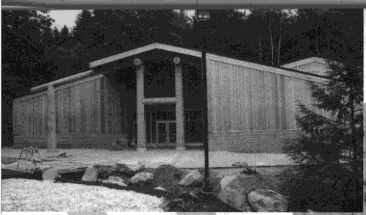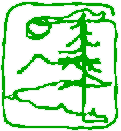Convener: Yvonne Peterson
Affiliated Faculty:Yvonne Peterson, Raul Nakasone, Gary
Peterson, David
Rutledge.
Native American Studies offers an open, alternative educational
opportunity. This Specialty Area's programs are organized into 20-year
cycles which mirror processes of human development and assist students
and faculty alike in developing their whole person.
Mary Hillaire,
the program's principal architect, envisioned the area as a way to
prepare learners to be able "to lead a genuinely human life with
respect to important human relationships to the land, others, work and
the unknown in recognition of the fact that as you give, you teach
others to give." That vision holds for the proposed programs of the
Specialty Area's second 20 year cycle:
Proposed Objectives
Students will develop a critical appreciation of different ways to
gather and apply information, knowledge, understanding and wisdom.
Students will learn self-respect while drawing upon inherent resources
and motivation for developing the whole person, and design important
self-reliant, life foundation standards for a meaningful education to
share with others.
The major goal of Native American Studies is to provide an open, alternative education opportunity through experiencing a Native American philosophy of education that promotes self-determination, individual research, goal setting, internal motivation and self-reliance.
This area is designed to serve a variety of student groups: Native American students who are interested in enriching their unique cultural heritage and developing strategies for self-determination in a pluralistic society; and other students interested in learning about their own traditional cultures and values including the dynamics of change in a pluralistic society.
Native American Studies, in keeping with student self-determined education, includes programs to complement various cognitive styles. Additionally, collaboration with other Specialty Areas and programs offers many interdisciplinary opportunities. Examples of such collaboration include studies in history, science, environmental studies, health and the expressive arts.
Work in Native American Studies begins with an interview with Specialty Area faculty In this interview, the student and faculty plan an individualized course of study to ensure that the student's personal needs are met.
Students are asked to answer four important educational questions:

Education and Cultural Center Evergreen's new Longhouse represents a living, contemporary, cultural link to the Indigenous Nations of the Pacific Northwest. The purpose and philosophy of the Longhouse Center is based in service and hospitality to the students, the community and the college. The primary function of the facility is to provide classroom space on campus, house Native American Studies, serve as a center for multicultural studies, at host conferences, cultural ceremonies, performances, exhibits and community gatherings.
Community: Time, Space, People and Place is a student-centered program, institutionally designed to incorporate community interaction in the education process. The student, community and institution will mutually share authority in developing a valuable education within a constantly changing pluralistic society.
The program provides an academic framework for students to clarify and validate their educational experience in a genuine community with a spirit of hospitality and reciprocal respect.
It is important that students interested in this program understand that, as part of the Native American Studies Specialty Area, this program includes a Native American philosophical form in teaching and learning. It is not designed to be a study of Native Americans though it includes issues especially relevant to Native Americans. That is to say that the faculty of Community: Time, Space, People and Place are interested in providing an environment in which faculty and students are in an experience in which they identify topics of mutual interest and share as partners the exploration of those topics. We will encourage students to assume responsibility for their choices. Faculty will facilitate the internalization of student motivation.
Four major questions frame the education process for the program:
This program is an open, alternative educational opportunity intended to include student-designed projects into a coordinated studies theme that values significant human relationships to the land, to work, to others and to the unknown.
Students wishing to apply for this program should submit a letter of application to Yvonne Peterson (Lab I), describing their research interest by the May 15,1996 Academic Fair. David will post the program list on his door by May 20, in time for registration.
Credit will be awarded in Native American historical perspectives, cultural studies, perspectives of a pluralistic society, philosophy, human resource development, individual project work and cross-cultural communication.
Total: 48 credits
This program is preparatory for careers and future study in education, archaeology, the arts, anthropology, multicultural studies, tribal government and Native American studies.

 Evergreen's Home
Page
Evergreen's Home
Page